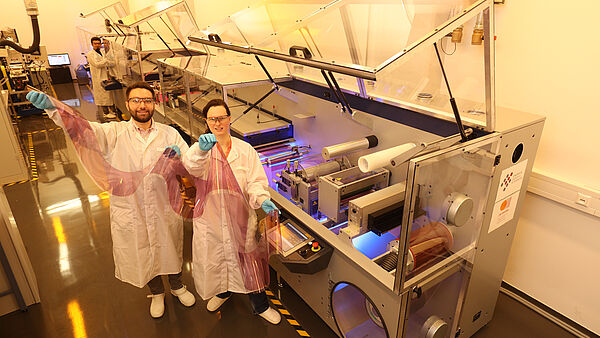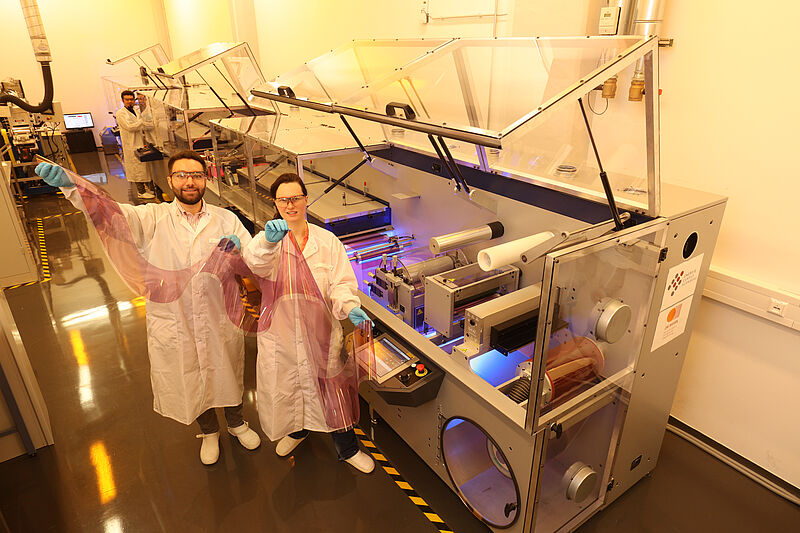Printed Photovoltaic
Organic photovoltaics is dedicated to the research of highly efficient, stable and scalable materials (organic molecules and polymers, chromophores and additives) for organic solar cells. In addition, investigations on the use of environmentally and industrially compatible ink formulations for upscaling of solar cells to approximately 30 x 30 cm 2 are conducted printability by means of different coating methods for industrial applications. As well as printing processes for the production of single layers we also consider the roll-to-roll processes.
Project leader
The Pilot Plant
The technikum is the heart of the photovoltaic research and provides a new technology platform for process development. In 2014, all essential equipment was procured and installed at approx. 200 m² laboratory and characterisation area. The equipment enables the possibility for the development of new synthesis methods, which allow the production of larger quantities (litre scale) of inks for roll-to-roll printing. The solar modules are manufactured by combining various printing techniques with laser structuring processes. This makes the manufacturing of complete components in a single operation possible.
- Preparation and characterization of thin solution processed films of small molecules and polymers
- Evaluation of existing and development of new coating and printing processes for organic solar cells and solar modules
- Analysis and characterization of single layers, multilayers, solar cells and modules
- Production of printed solar cells / modules
- Development of Electrode materials
- Development of structuring procedures and interconnection techniques
- Scaling of printed cell layers to industrially relevant sizes (approx. 30 x 30 cm²)
- Construction of a roll-to-roll pilot plant for the production of printed solar modules in an inline process and development of coordinated process steps
- Lifetime of Organic Electronics: Encapsulation Processes and Investigations of Ageing Processes
- Materials sciences for organic, inorganic and hybrid components
- Nanotechnology
- Coating and printing methods
- Characterization and analysis of organic and inorganic thin films
- Simulations of the behavior of small molecules and polymers, solar cell and module design as well as flow behavior of inks
- Development of environmentally compatible, green formulations
- Solar cell and module design
- Structuring by means of printing or laser processes
- Printing and coating technology for (opto-) electronic thin-film components
- Conception and production of solar cells and modules by means of printing and coating processes as well as laser ablation
- Characterization of thin film solar cells and modules
- Development of ink formulations
- Scaling of synthesis and printing processes
- Electrical and optical simulation of materials and components
- Lifetime and stability of organic solar modules
- Project management of complex research projects (incl. acquisition of external funds)
- Extensive network in the above-mentioned areas (scientific and industrial), material development and printing processes, solar cells research landscape, industrial partners
- Chemical laboratory for the synthesis of ink formulations
- Glove box for processing various materials that need to be protected from air and moisture
- Flatbed coating machines with squeegee or slot nozzle
- Mini roll coater with slot die and flexography unit
- Ink-Jet Printer
- Screen printer
- Spray coatinger
- Loop-Coater with slot die, UV- and IR drying unit
- Thermal evaporator for the vapor phase deposition of metals
- Roll-to-roll pilot line for inline production of solar cells and modules
- Femtosecond laser system for structuring modules
- Confocal microscope
- Solar simulator for module characterization
- Evaluation of the printability of new materials for organic solar cells and electronic components
- Development of new printing, coating and testing processes for industrial applications
- Development of green formulations for new materials
- Organic electronics
- Printing and coating technology
- Printed Photovoltaics
- Printed electronics (OLED, display, lighting...)
- Printed membranes/electrodes (fuel cells, accumulators...)
- Printed sensor technology


















![[Translate to Englisch:] [Translate to Englisch:]](/fileadmin/_processed_/0/f/csm_Eichelbaum_F_IOD_CampusFutureDriveline_06_komp_5dbad012c6.jpg)
